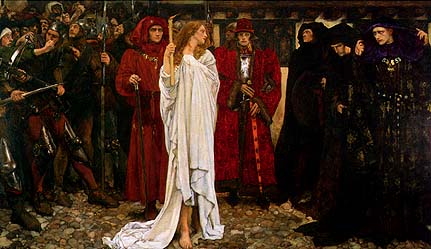
Oil on canvas, 49 x 85 inches. Museum of Art, The Carnegie Institute, Pittsburgh, Pennsylvania.

Oil on canvas, 49 x 85 inches. Museum of Art, The Carnegie Institute, Pittsburgh, Pennsylvania.
In Act II, Scene iii, of Henry VI, Part 2, Eleanor, Duchess of Gloucester, is accused of witchcraft. Her supposed co-conspirators are to be executed, but she is exiled to the Isle of Man. In Scene iv she is forced to do public penance. The directions say, "Enter the Duchess barefoot in a white sheet, with verses pinned upon her back and a taper burning in her hand, with the Sheriff and Officers and Sir John Stanley. A crowd following." She gets no help from her husband Humphrey, Duke of Gloucester, the uncle of Henry VI and the Protector of the young king; Gloucester advises, "Be patient, gentle Nell; forget this grief." Eleanor then foretells the fall of her husband through the machinations of his enemies Suffolk, York and Cardinal Beaufort. Abbey, with his usual attention to the text and to historical detail, captures the poignancy of the moment when Eleanor, frail, humiliated and abandoned, prophesies:
Ah, Gloucester, teach me to forget myself!
For whilst I think I am thy married wife
And thou a prince, protector of this land,
Methinks I should not thus be led along,
Mail'd up in shame, with papers on my back,
And followed with a rabble that rejoice
To see my tears and hear my deep-fet groans.
The ruthless flint doth cut my tender feet,
And when I start, the envious people laugh
And bid me be advised how I tread.
Ah, Humphrey, can I bear this shameful yoke?
Trow'st thou that e'er I'll look upon the world,
Or count them happy that enjoy the sun?
No; dark shall be my light and night my day;
To think upon my pomp shall be my hell.
Sometime I'll say, I am Duke Humphrey's wife,
And he a prince and ruler of the land:
Yet so he ruled and such a prince he was
As he stood by whilst I, his forlorn duchess,
Was made a wonder and a pointing-stock
To every idle rascal follower.
But be thou mild and blush not at my shame,
Nor stir at nothing till the axe of death
Hang over thee, as, sure, it shortly will;
For Suffolk, he that can do all in all
With her that hateth thee and hates us all,
And York and impious Beaufort, that false priest,
Have all limed bushes to betray thy wings,
And, fly thou how thou canst, they'll tangle thee:
But fear not thou, until thy foot be snared,
Nor never seek prevention of thy foes.